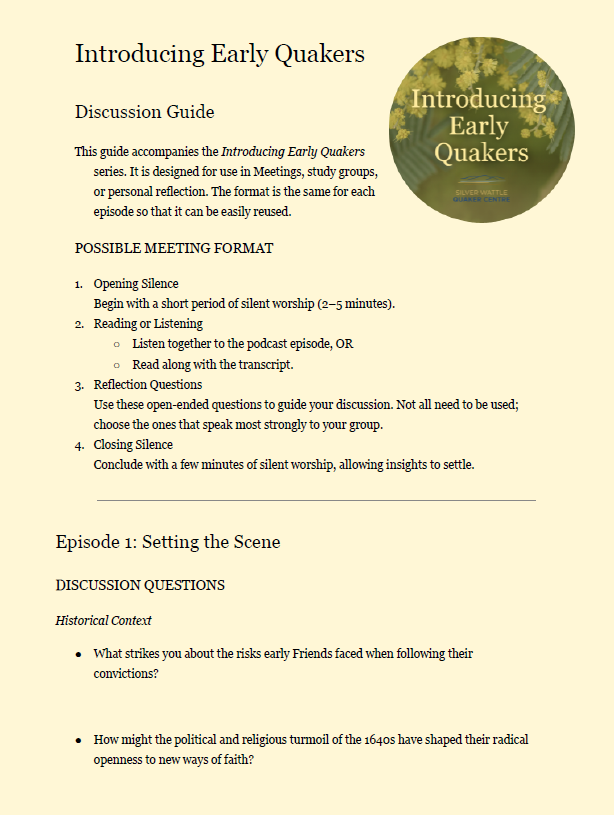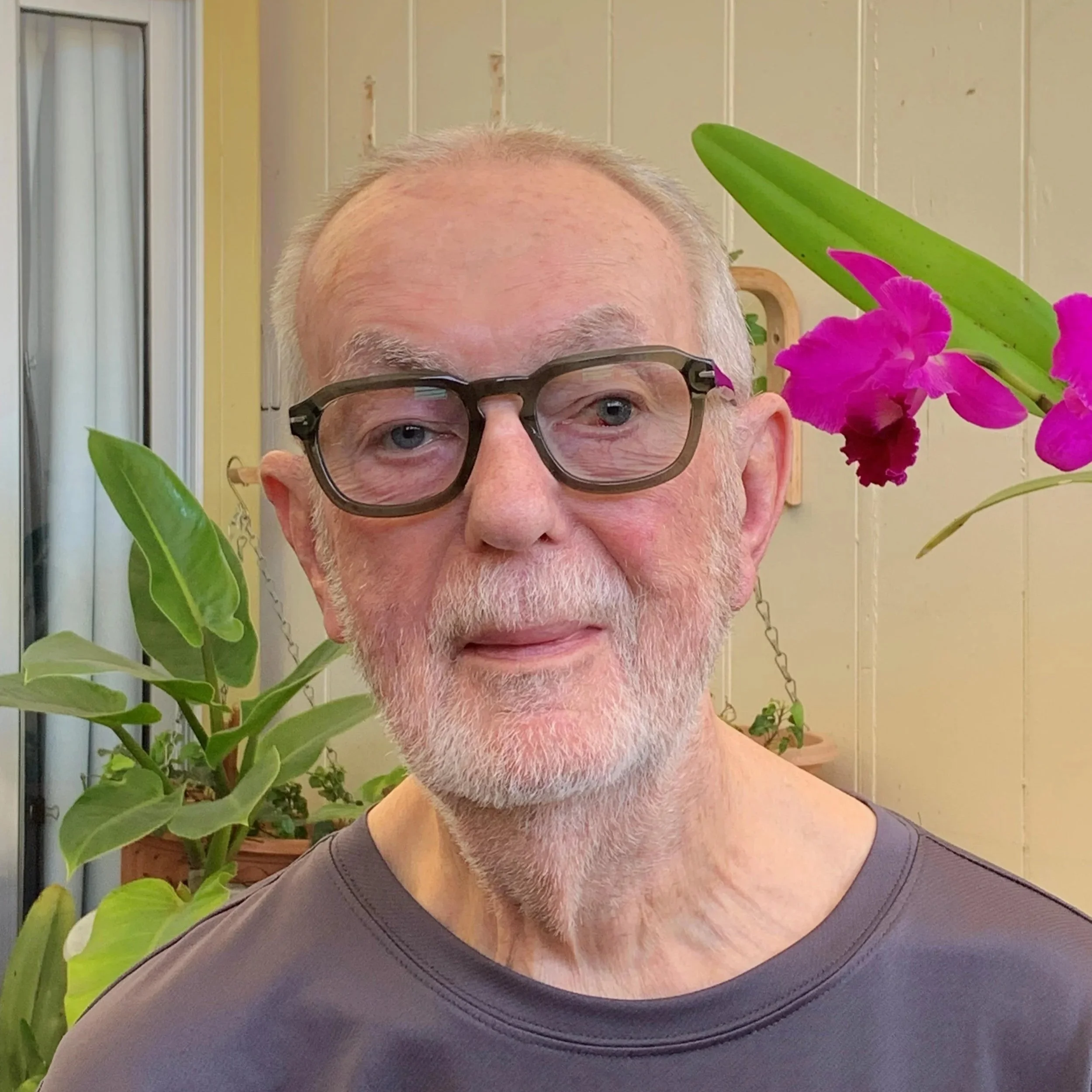Introducing Early Quakers — Episode 1: Setting the Scene
Episode 1 Summary
Episode 1 sets the social and political context in which the early Quakers emerged. Narrator Michael Corbett shares how 17th-century England was a time of upheaval, persecution, and radical spiritual seeking. From civil war to the Puritan crackdown, early Friends discovered their faith not in institutions, but in the inward experience of divine truth.
Show Credits
Presented by: Silver Wattle Quaker Centre
Written and Narrated by: Michael Corbett
Introductions Read by: Ann Zubrick, Board Member, Silver Wattle
Produced and Edited by: Holly Dhynes, Quakers Australia
Based on materials originally developed by: Michael Corbett, with gratitude to David Johnson
Produced on Ngambri–Ngunnawal land, near Weereewa (Lake George), where Silver Wattle Quaker Centre is located. This series includes contributions from Friends across Australia and around the world.
Music: Classical Guitar by Mantikore (licensed from AudioJungle)
Website: https://silverwattle.org.au/podcast
Explore the series on these platforms
-
Transcript: Episode 1 – Setting the Social and Political Scene
Ann:
Welcome to this podcast series coming courtesy of Silver Wattle Quaker Centre, located in central New South Wales on the edge of Werriwa or Lake George, the largest freshwater lake in Australia. We acknowledge and give thanks for First Nations groups’ care of Country. We commit to its ongoing care.I’m Ann Zubrick, a member of the Silver Wattle Board.
In October 2023, Michael Corbett, a Queensland Quaker, attended a course at SW exploring the lives of remarkable men and women in the latter part of the 17th century who became early Quakers. He subsequently compiled these stories to share in nine podcast episodes.
We hope these stories inspire and inform you. You can explore more about Silver Wattle’s retreats and learning opportunities — both in-person and online — at silverwattle.org.au.
Here is Introducing Early Quakers: Episode 1 – Setting the Social and Political Scene, narrated by Michael Corbett.
Michael:
Imagine, if you would, that you are amongst the first 2 or 3 people in the world who came to be named ‘Quakers’.To use a phrase from Professor Brian Cox describing when the Big Bang occurred, he said “that there was only today, no yesterday.” One can imagine how it was for the first-generation Quakers.
There were no Meeting Houses or YMs, no Handbooks of Practice & Procedure, no newsletters or journals for us to read and study. There was also no social stability. The political environment was in chaos.
From 1639 to 1653, there was civil war between the Royalists [the Cavaliers] in the North and West of England and the Parliamentarians [Roundheads] in the South and Eastern regions. King Charles I was executed, his son exiled, and Oliver Cromwell rose to power and became the Lord Protector of the Commonwealth and called The Great Dictator.
He was also known as a Puritan — one who wanted to purify the Church of England of Roman Catholic practices — religious persecution.
Added to this, there was persecution by the Church and the Courts against some so-called ‘Dissenters’ — those who had access to the Bible that was now available in English and became dissatisfied with the teachings of the Church. What was in the sermons by the priests did not match up with what was in the Bible.
Many early Quakers were very Bible-centred, and this led them on a road that would clash with the authorities. The Bible does not say anything about churches, cathedrals, clergy, popes or consecrated land, any fixed form of service, hymns, etc. But it does say “For where two or three are gathered in my name, I am there among them.” — Matthew 18:20
This means in a field, in a barn, in a house, and with so many early Friends — prison — anywhere but a church.
It was not a good time to be a free thinker or a Seeker. You were ostracised by the Church if you didn’t attend services regularly. You were expected to support the Church by tithing your donations and could be hauled before the courts for non-compliance.
This led to them to quote from the Bible — the very book that they were asked to swear on — which landed them in more trouble.
Early Friends knew that the Bible said not to swear an oath. In Matthew 5:33, it reads, “You are not to swear at all. Plain ‘yes’ or ‘no’ is all you need.” And in James 5:12, “Do not use oaths… when you say yes or no, let it be plain ‘Yes’ or ‘No’.” George Fox writes, “They gave me the book to swear on, and the book saith, ‘Swear not at all.’”
Many early Friends were jailed simply because they preached — which was called ‘blasphemy’ — and, when charged, declined to swear an oath, which led straight to prison. Hundreds of Friends were jailed for their beliefs in the harshest of conditions.
So, what did the early generation Quakers have? I am convinced that they had a deep spiritual awakening. They had no one they could ask.
What they did was to turn inward, wait, pray, and seek out the experience of the divine, that we call that ‘inner voice’ that comes to us. They hearkened to ‘Inward Light and Truth’.
George Fox had his ‘light bulb’ moment in 1647 after wandering round parts of mid-England for a few years, facing an inner struggle over what was in the Bible and how the priests were behaving and preaching.
George was on top of Pendle Hill in Lancashire when he received a revelation that “There is one, even Christ Jesus, who can speak to thy condition,” and became convinced that one could have a direct experience of Christ — without the aid of the clergy or church.
He believed that “the Lord let me see in what places He had a great people to be gathered.”
Many Friends believed that they experienced the voice of God, guiding them, leading them onto forming what is now called the Religious Society of Friends [Quakers].
William Penn wrote that “they were changed men and women before they went out to change others.”
If you want to read more about the turmoil that surrounded early Friends, visit Google and enter “A brief journey back in time by Michael Corbett.”
I will be introducing one person each month with some of their written works, and we hope that you can join us.
I have to acknowledge the immense contribution that Wikipedia, the Britain YM Handbook, and the writings of David Johnson, plus my time at Silver Wattle studying 1st and 2nd generation Quakers, that have provided me with the information contained.
Any errors are mine.
In Love and Peace,
Michael CorbettAnn:
Thank you for listening to this first podcast series from Silver Wattle Quaker Centre.We hope these stories have sparked reflection and a deeper appreciation for the courage and spiritual depth of early Friends.
If you'd like to explore Quaker spiritual practices or join us for a retreat or course — either in person or online — visit silverwattle.org.au.
We'd love to welcome you.
-
Episode 1: Setting the Scene
DISCUSSION QUESTIONS
Historical Context
What strikes you about the risks early Friends faced when following their convictions?
How might the political and religious turmoil of the 1640s have shaped their radical openness to new ways of faith?
Faith and Practice
Early Friends worshiped in fields, barns, and prisons. What does that suggest about the meaning of “church”?
How do you understand the verse: “Where two or three are gathered in my name, I am there among them” (Matthew 18:20)?
Personal Reflection
George Fox spoke of hearing Christ say, “There is one, even Christ Jesus, who can speak to thy condition.” Has there been a time when you felt directly spoken to by Spirit, Light, or conscience?
What practices help you “turn inward” to listen for the Inner Light today?
Community and Transformation
William Penn said early Friends were “changed men and women before they went out to change others.” What do you think it means to be inwardly transformed before engaging in outward witness?
How might this challenge or inspire us in our Quaker communities today?
Use these discussion questions in your group or Meeting – 📄Download the PDF
Small Groups

We’ve created a printable PDF with thoughtful discussion questions designed for use in small groups or worship-sharing settings. You’re warmly invited to download and share it with your Meeting or group as you explore the lives and faith of early Friends.
Download Discussion Questions (PDF)Michael Corbett
Writer and Voice of the Series
Ann Zubrick
Voice of the Series Opening
Share the Word
This series is free to use and share widely. Please help us spread the word among Friends and seekers by sharing the SoundCloud link, this page,



